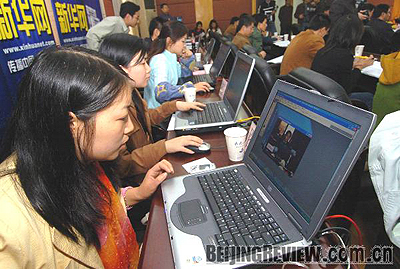|

The National People's Congress (NPC), China's top legislature, will start its new five-year term in March. In the past five years, the NPC, defined by the Constitution as the organ of supreme power, has conducted fruitful exploration in introducing more public participation in the legislation process. The most impressive progress is that the voices of the vox populi have been given rising importance over the formulation of laws that affect people's daily lives. Public participation in the legislation process has been written into institutions.
Legislative hearings
Last May, the Standing Committee of Gansu Provincial People's Congress held its first ever legislative hearing, where 16 representatives were selected from the 156 applicants. This hearing was about the controversial rules of the provincial regulations on the protection of consumers' rights and interests. The focal point of the hearing was whether recipients of medical treatment and agency services should also be defined as consumers.
Kang Changrong, a participant in the hearing and resident of Lanzhou, the capital city of Gansu Province, said, "Allowing ordinary citizens into the procedures of law and regulation formulation is one form of real democracy."
Christine Chung, China Program Director of the U.S.-based National Democratic Institute for International Affairs and long-time observer of the legislative hearing in China, noted that China's progress in opening up legislative procedures was visible as economically backward areas like Gansu have started the practice of legislative hearings.
In 1996, the term "public hearing procedure" appeared in a law, the Law on Administrative Penalty, for the first time in China. In September 1999, the first legislative hearing in China took place in southern Guangdong Province. The Legislation Law that came out in 2000 stipulates that the legislature shall listen to the opinions of various quarters by holding forums, seminars and hearings. The next few years have seen a rising number of legislative hearings, held mainly by legislature at the provincial level.
Official statistics indicate that between the release of the Legislation Law and the end of 2004, 24 provincial-level standing committees of people's congresses held 38 legislative hearings on 39 regional regulations, which involved a wide range of topics, such as market supervision and the protection of consumers' rights and interests.
On September 27, 2005, 20 public representatives from different professions, social backgrounds and income levels from various parts of China took part in the first legislative hearing held by the NPC, where they voiced their opinions on the individual income tax threshold.
Before this legislative hearing, the NPC had invited hearing participants and received 4,983 applications. According to Chinese law, any citizen over 18 years old with a salary income could apply to take part in the hearing. The 20 finalists included a university professor, a lawyer, government officials, white-collar workers and migrant workers. The hearing, broadcast live from the beginning, attracted enormous coverage in the press.
The draft of an amendment to the Law on Individual Income Tax Law had planned to raise the threshold of individual income tax from the monthly salary of 800 yuan ($111.10) to 1,500 yuan ($208.3). After hot debate among hearing participants, the threshold was finalized at 1,600 yuan ($222.20).
Legal experts agreed that this adjustment demonstrated the practical impact of public opinion on the revision of the Law on Individual Income Tax Law.
Yang Jingyu, head of the NPC Law Committee who presided over the hearing, said holding the hearing was meant to give a platform to different opinions. "This is also an important measure of the NPC Standing Committee to stick to a new approach of inviting public participation and enhancing the transparency of legislation work," Yang said.
Cai Dingjian, a professor at China University of Political Science and Law, said the first legislative hearing held by China's top legislature
| 